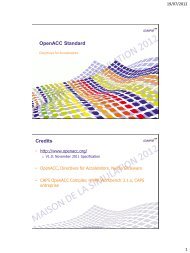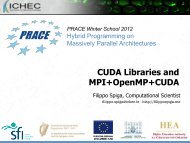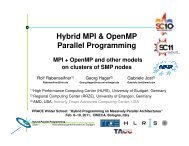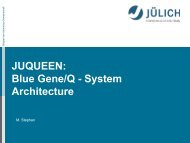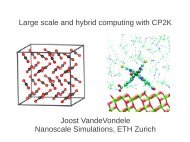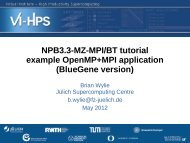Introduction to PyOpenCL - Prace Training Portal
Introduction to PyOpenCL - Prace Training Portal
Introduction to PyOpenCL - Prace Training Portal
You also want an ePaper? Increase the reach of your titles
YUMPU automatically turns print PDFs into web optimized ePapers that Google loves.
Py(thon)OpenCL overviewWhat is Python?– general purpose HL language– multi-paradigm : Imperative, Object-oriented, Functional etc.– dynamically typed, au<strong>to</strong>matic memory managementNumPy module:– extension <strong>to</strong> Python for scientific computing– adds support for (large) multi-dimensional arrays– provides library of math functions– (almost) as fast as CCaSToRC
Python example:import numpy as npdef compute_summ (x , y):return x + yA = np.array([1, 2, 3, 4, 6], dtype = np.float32)B = np.pi / AC = compute_summ(A, B)for element in C:print elementCaSToRC
CaSToRCA brief introduction <strong>to</strong> programming with <strong>PyOpenCL</strong>The first look at <strong>PyOpenCL</strong> code :import pyopencl as cl, numpy as npsource = “””kernel void demo(global int *res){res[get_global_id(0)] = get_local_id(0);}“””#Initialization phase:ctx = cl.create_some_context()queue = cl.CommandQueue(ctx)#Create mem object:dout = cl.Buffer(ctx, cl.mem_flags.WRITE_ONLY,size = (1024 * np.dtype('int32').itemsize))
The first look (cont.):#Compilation phase:prg = cl.Program(ctx, simple_kernel).build()#Execution phase:(event =)prg.demo(queue, (1024, ), None, dout)hout = numpy.empty((1024,), dtype = numpy.uint32)(event =)cl.enqueue_read_buffer(queue, dout, hout).wait()#Now do something with data on the host:for element in hout:print elementCaSToRC
PlatformsAvailable plaforms: 'Apple', 'ATI Stream' , 'NVIDIA CUDA'List of Platfrom instances:class pyopencl.get_platforms()Select preferred platform (example):for found_platform in pyopencl.get_platforms():if found_platform.name == 'NVIDIA CUDA':my_platform = found_platformCaSToRC
DevicesOpenCL devices: ALL, CPU, GPU, DEFAULT, ACCELERATOR etc ..List of devices within platform matching device_type:class pyopencl.get_devices(device_type = device_type.ALL)Select preferred device (example):for found_device in my_platform.get_devices():if pyopencl.device_type.<strong>to</strong>_string(found_device.name) == 'GPU':device = found_deviceCaSToRC
Contexts, Command Queues, Eventscontext = pyopencl.Context(devices = None | [dev1, dev2], dev_type = None )context = pyopencl.create_some_context( Interactive = True )– create from device type, or list of devices– device_type : ALL, GPU, CPU etc.– <strong>to</strong> create context 'somehow' use pyopencl.create_some_contextqueue = pyopencl.CommandQueue(ctx, dev = None, properties = [(prop, value), ...])– attached (at least) <strong>to</strong> one device– commands in a command queue can be executed synch. or asynchronously– for asynch. use OUT_OF_ORDER_EXEC_MODECaSToRC
Contexts, Command Queues, Events (cont.)All work is done through command queue(s) synchronously or async.:– Computations– Memory operationsCommand format (always returns new event):new_event = pyopencl.enqueue_{command} (queue, ...,wait_for = [event1, event2, ....])– command in a queue implicitly wait for completion of previous command(s)Synchronization:new_event.wait()CaSToRC
Memory objects: Buffersbuf = pyopencl.Buffer(context, flags , size = 0, hostbuf = None)– flags : {READ, WRITE}_ONLY, READ_WRITE, etc.– hostbuf needs Python buffer interface (e.g numpy.ndarray)– sparse resources can be explicitly freed: buf.release()event = pyopencl.enqueue_{read/write}_buffer(queue, buf, hostbuf,dev_offset = 0, wait_for = None, is_blocking = True)– for blocking/non-blocking memory transfer : True / False– mapping memory in Host address space: pyopencl.MemoryMap– WARNING: is_blocking defaults <strong>to</strong> True only in 2011.1 version!CaSToRC
Memory objects: Imagesimage = pyopencl.Image(context, flags , format, shape, pitches, hostbuf)– shape : 2D or 3D tuple– sparse resources can be explicitly freed: image.release()event = pyopencl.enqueue_{read/write}_image(queue, buf, hostbuf,..... , wait_for = None, is_blocking = True)– for blocking/non-blocking memory transfer : True / Falseevent = pyopencl.enqueue_copy_image_<strong>to</strong>_buffer(queue, src, dst, …)event = pyopencl.enqueue_copy_buffer_<strong>to</strong>_image(queue, src, dst, ...)CaSToRC
Programs and KernelsProgram object:program = pyopencl.Program(context, source)– source : OpenCL device codeTo build the program use:program.build(options = “”, devices = None)– options : cl-mad-enable etc.Kernel object:kernel = pyopencl.Kernel(program, 'kernel_name')CaSToRC
CaSToRCExecution:Set kernel's arguments:kernel.set_args(args)args:– buffers, images– use None for null-pointers– use numpy.dtype construc<strong>to</strong>r for scalars (e.g. numpy.float64, numpy.uint32 etc.)– use pyopencl.LocalMemory(size) class <strong>to</strong> pass __local memory argumentsKernel execution:(event =)pyopencl.enqueue_nd_range_kernel(queue, kernel,(Gx, Gy, Gz), (Lx, Ly, Lz), offset = 0, wait_for = None)
A walk-through example : computation of piimport pyopencl as cl, numpy as np#Available platform names:AMD = 'ATI Stream'NVIDIA = 'NVIDIA CUDA'#Execution domain per device:LOCAL DOMAIN_SIZE = {'CPU' : 2; 'GPU' : 256}GLOBAL_DOMAIN_SIZE = {'CPU': 8; 'GPU': 65536}#Device source (not shown here!):PI_KERNEL = “””__kernel pi_ocl(__global double *out, local double *lmem, double par1, int par2)“””CaSToRC
A walk-through example (cont.)Notes on source code:– For double precision each vendor provides different extensions:#pragma OPENCL EXTENSION cl_amd_fp64 : enable (AMD)#pragma OPENCL EXTENSION cl_khr_fp64 : enable(NVIDIA)– AMD Platform allows for printf in device kernels:#pragma OPENCL EXTENSION cl_amd_printf : enable– WARNING: __CPU__ macro defined only for AMD platform!CaSToRC
CaSToRCA walk-through example (cont.)#Initialization phase (select preferred platform and device type):for found_platform in cl.get_platforms():if found_platform.name == NVIDIA:my_platform = found_platformprint "Selected platform:", my_platform.namebreakfor device in my_platform.get_devices():dev_type = cl.device_type.<strong>to</strong>_string(device.type)if dev_type == 'GPU':dev = deviceprint "Selected device: ", dev_type
A walk-through example (cont.)#create context on found list of devices:context = cl.Context([dev])#create command queue:queue = cl.CommandQueue(context,properties=cl.command_queue_properties.PROFILING_ENABLE)#Create and build program object for given device source:program = cl.Program(context, PI_KERNEL).build()#NOTE: build() may accept options (e.g., cl-mad-enable etc.)CaSToRC
A walk-through example (cont.)#Memory initialization phase:#Create OpenCL buffers:dout = cl.Buffer(context, cl.mem_flags.WRITE_ONLY,256 * np.dtype('float64').itemsize)#Create __local memory argument for the kernel (dynamical allocation!):lmem_arg = cl.LocalMemory(256 * np.dtype('float64').itemsize)#Create kernel constants:npts = pow(2, 30)step2 = pow((1.0 / npts), 2)CaSToRC
A walk-through example (cont.)#Create Kernel object (using kernel's entry point):pi_kernel = cl.Program(program, 'pi_ocl')#Execution phase:event = pi_kernel(queue, (65536, ), (256, ), dout, lmem_arg,np.float64(step2), np.int32(npts))#Compute execution time (using event profiling):event.wait()elapsed = 1e-9 * (event.profile.end – event.profile.start)print "Execution time: %g s" % elapsedCaSToRC
CaSToRCA walk-through example (cont.)Notes on Execution phase:– WARNING: Python float and int objects will NOT work:scalar arguments must be an object acceptable <strong>to</strong> thenp.dtype construc<strong>to</strong>r : np.int32() , np.float32() etc.– for dynamically allocated local memory use cl.LocalMemory(size)– global/local work size pass as tuples, (e.g. , (256, 64, 1) etc.)
A walk-through example (cont.)#Create host array (as numpy ndarray):hout = np.zeros((256, ), dtype = np.float64)#Now copy data:event = cl.enqueue_read_buffer(queue, dout, hout)#Wait until the data copy will be complete:event.wait()#Perform final reduction using sum function from numpy lib:my_pi = (1.0 / npts) * np.sum(hout)print "Error: ", abs(np.pi - my_pi)CaSToRC
How <strong>to</strong> start?What you need <strong>to</strong> begin with <strong>PyOpenCL</strong>:– OpenCL <strong>to</strong>olkit (AMD APP SDK, NVIDIA CUDA)– Python (ver 2.4 and later)– NumPy package– OpenCL device available (for NVIDIA: NVIDIA GPU)– <strong>PyOpenCL</strong> package installed (see next slide)Additional notes:– cl_amd_printf extension may be very helpful– AMD OpenCL platform supports x86 architectureCaSToRC
Links:• http://mathema.tician.de/software/pyopencl– A. Kloekcner's web-page: <strong>PyOpenCL</strong> soft, documentations• www.khronos.org– OpenCL documentations• http://developer.amd.com/gpu/AMDAPPSDK– AMD APP SDK, incl. OpenCL for x86 architecture• http://developer.nvidia.com/object/opencl.html– NVIDIA OpenCL, documentations, forumCaSToRC
Thank youwww.cyi.ac.cyCaSToRCCaSToRC




